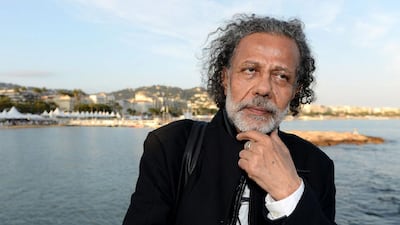CANNES // When Palestinian film maker Nasri Hajjaj booked his place at this year’s Cannes Film Festival, he probably expected to be just another largely unknown Arab film maker with a project he hoped to fund.
But the 13-minute clip of Hajjaj's unfinished documentary, Munich: A Palestinian Story, eclipsed many of the gathered Hollywood royalty to become one of the most talked-about events of this year's festival.
The film offers an Arab perspective on the 1972 deadly assault on Israeli athletes at the Munich Olympics, in which eight gunmen from the Palestinian guerrilla group Black September took members of the Israeli Olympic team hostage. Eleven Israelis, five Palestinians and one German policeman were killed in the standoff and subsequent rescue attempt.
The militants had demanded the release of 236 prisoners held in Israeli prisons – including Palestinian activists and members of the left-wing German guerrilla organisation, the Red Army Faction – which Israel rejected.
The film is partly funded by Dubai International Film Festival’s Enjaaz fund. It would doubtless have remained an underground documentary if the Conseil Representatif des Institutions Juives de France – an umbrella body for French Jewish organisations – had not begun a campaign to have the screening banned. Even the mayor of Cannes, David Lisnard, stepped in to support the ban, claiming it could threaten “public order”.
After much uncertainty, the private screening finally went ahead at around 5.30pm on Monday – during its orginally scheduled time slot. The National spoke with Hajjaj afterwards to hear what he thought about the controversy.
“They made all this fuss,” said Hajjaj. “They called it a film. It’s not a film. It’s a 13-minute industry screening. It’s not even finished yet.”
“They said it encourages terrorism. Nothing in it encourages terrorism. And when it is finished nothing in the whole film will encourage terrorism,” he said.
“These people talking of bans, they haven’t even seen the film – because as yet there is no film. They haven’t seen it and they want to ban it. They have stereotypes in their mind,” he added, insisting the film is not a threat to public order.
“It’s a threat to the way people think. A threat to whether you are free in your mind or you are not free in your mind. To whether you want to be human or you do not want to be human. To whether you want to think of other people and their lives, and if they have justice and peace, this is the question.”
It is not the first time that the events of Munich have been covered on screen, but Hajjaj says he hopes to offer a different perspective with his interpretation.
"The Israelis have had since 1976 – when the first film [21 hours at Munich] was made about this – to 2006 when the Spielberg film [Munich] was made to tell their own story. Sometimes very biased, sometimes less biased, but there has never been a film from a Palestinian or Arab perspective."
“Why do I not have the right to tell this story? I am a party to it, a second party, but a party,” said Hajjaj, who grew up in a Lebanese refugee camp with one of the hostage-takers, Afif Hamid, who was killed in the Munich operation.
“See the film and then judge,” he said.
The maxim goes that all publicity is good publicity.
And judging by the number of international press that flocked to the Cannes’ UAE Pavilions to try to catch a word with Hajjaj – some even leaning over the fence from the adjoining Greek Pavilion after the UAE’s reached capacity – his film should have no trouble winning funding.
The director himself is not so sure though. “I don’t know,” he said. “Maybe the publicity will help, but maybe some producers will look at this and won’t be happy to support finishing the film because we have all these protests.” He expects another three days of shooting to complete the film.
“I think it’s a film that really asks questions,” he concluded. “It doesn’t give answers, it just asks questions and I give my interpretation. That may be wrong or bad, I don’t know, but I’m not dogmatic, I’m not a fundamentalist, I’m not a fervent Palestinian nationalist.”
“I lived half of my life in a camp, I’m 65 now, and that’s why I feel the Palestinian story. Without that issue of suffering Palestinians have had since 1948, I wouldn’t care.”
“I just want to offer another side to the story, because it’s my story too.”
cnewbould@thenational.ae

